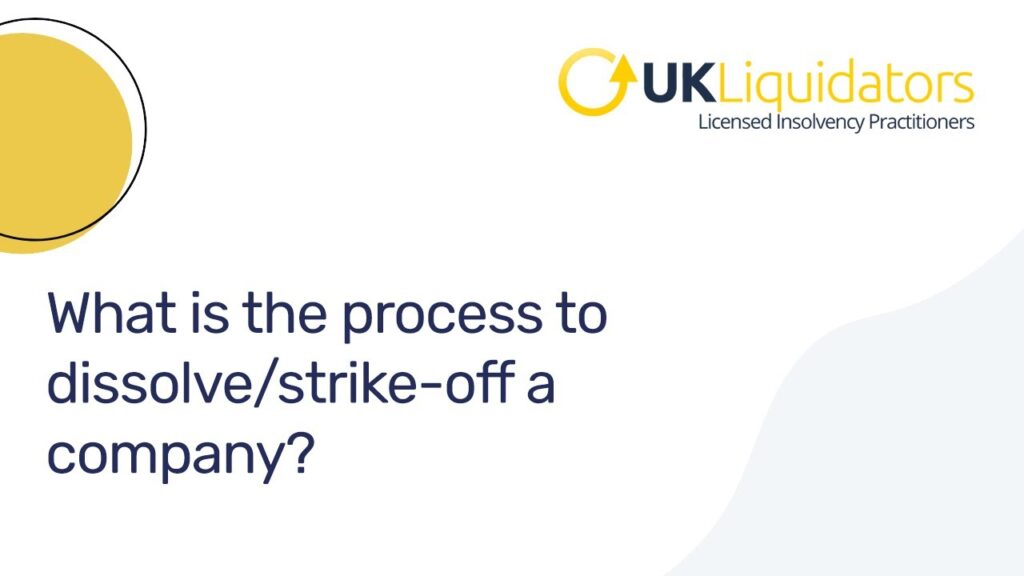Trick Actions In the Compulsory Strike Off Process
Trick Actions In the Compulsory Strike Off Process
Blog Article
Understanding the Process and Effects of Compulsory Strike Off Under Firm Legislation
In the world of business regulation, the process and ramifications of obligatory strike off hold considerable weight for organizations and their supervisors. Recognizing the intricacies of why business face such an end result, the careful actions included in the strike off process, and the far-ranging effects for all parties involved is essential in browsing the facility landscape of company administration. As we explore the reasons behind required strike offs, the following treatments, and the succeeding effects, a more clear image emerges of the profound impact it can carry individuals and entities alike.
Factors for Compulsory Strike Off
Obligatory strike off under business law is initiated by the regulatory authorities for particular reasons associated with functional or non-compliance irregularities. The key reason for a company to face compulsory strike off is the failing to file annual returns or economic statements for an extensive duration. This non-compliance indicates an absence of transparency and adherence to regulatory requirements, increasing issues regarding the business's economic wellness and liability.

Process of Strike Off
Offered the regulatory authority's initiation of obligatory strike off for various factors, understanding the process of strike off is essential for companies facing potential dissolution under company law. The procedure normally starts with the governing authority sending notifications to the firm's licensed office address, informing them of the upcoming strike off. It is crucial for the firm to attend to any outstanding concerns, such as filing past due records or clearing up outstanding costs, within the specified timeframe to stay clear of dissolution.

Implications for Business
What are the implications for business dealing with compulsory strike off under business legislation? Companies encountering required strike off might experience several substantial effects.
Moreover, the firm's properties at the time of strike off end up being residential or commercial property of the state, which can lead to financial losses for investors and financial institutions. Shareholders might lose their investments, while creditors might struggle to recoup any kind of impressive financial obligations owed to them by the struck-off business.
In addition, directors of the firm may encounter disqualification from holding similar settings in other business for a specified duration (first gazette notice for compulsory strike-off). This can stain their professional online reputation and limit their future organization opportunities
Repercussions for Supervisors
Encountering mandatory strike visit off under company regulation can have serious implications for directors, affecting their future duties in various other business and potentially tarnishing their specialist standing. Supervisors of a company encountering obligatory strike off might discover it testing to secure directorial placements in other companies in the future. In general, the repercussions of obligatory strike off for supervisors prolong beyond the specific company in question, impacting their profession potential customers and specialist reliability in the long term.
Staying Clear Of Compulsory Strike Off

Final Thought
In verdict, understanding the process and implications of obligatory strike off under firm law is important for supervisors and companies to ensure compliance with policies. By being conscious of the factors for strike off, the procedure involved, and the consequences for all parties entailed, companies can take steps to stay clear of going through mandatory strike off. It is link very important for supervisors to be proactive in maintaining correct documents and meeting statutory responsibilities to avoid the risk of strike off.
Provided the regulatory authority's initiation of required strike off for different link reasons, understanding the procedure of strike off is vital for companies encountering prospective dissolution under firm legislation.What are the implications for companies encountering mandatory strike off under firm legislation?Encountering mandatory strike off under firm law can have extreme ramifications for supervisors, impacting their future functions in other business and possibly tarnishing their professional standing. Directors of a firm dealing with required strike off may locate it challenging to safeguard directorial settings in other business in the future.In conclusion, comprehending the procedure and implications of compulsory strike off under firm legislation is important for supervisors and business to guarantee conformity with guidelines.
Report this page